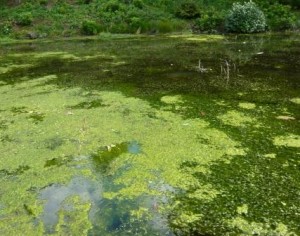
Dealing With Weeds in Ponds
To combat Algea, Blanket Weed and Invasive aquatic species you need to be on your guard.
A small wild life pond doesn’t have to be weedy in either sense. This pond in our park for example is a fairly large size. However as you can see it is ‘Weedy’ in the gardening sense.
Removing Blanket Weed
- Oxygenating plants are the best and organic method but may fill half the pond.
- For a small pond you can try the winding it around a stick method but roots regrow and small critters may be thrown on the compost heap with the weed.
- Sun causes growth of blanket weed and a covering of water lilies will help keep it down
- Hydrogen peroxide inhibits all algae growth and this can be created organically using straw bales made from Barley – Put some in a stocking for a smaller pond or try a chemical concentrate
- UV filters are expensive but if you want to be sure to see your fish hang the expense.
Algae and Other Pond Weeds
- One easy way to get rid of an algae mess is to dredge or empty your pond. This is obviously impractical in many circumstances.
- Increased circulation in the pond will stop algae.
- Grass carp love to eat pond weeds and plants whilst young grass carp will feed on algae.
- Biocides and special herbicides can also control pond weed
- Some weeds can be lifted out or twisted around a stick and pulled out. Leave on the side to let creatures return to the pond before composting.
- Cover the pond so leaves do not accumulate. They will rot and gases given off will damage oxygen levels for fish.
Get blanket weed buster from Amazon as a Christmas present.
Invasive Aquatic Plants
- New Zealand Pigmyweed or Swamp Stonecrop Crassula helmsii forms a dense mat that reduces light and displaces native plants.
- Water fern Azolla filiculoides or Fairy Fern. Easily transfers and can rapidly blanket the top of a pond almost looking as though children can walk on it. Green in summer turning red in autumn.
- Floating Penywort Hydrocotyle ranunculiodes grows rapidly 8 inches a day. Reducing oxygen and thick enough to look like dry land it is a major danger.
- Water Primrose and Parrot’s Feather are also in danger of clogging waterways and out-competing native plants.
See our report on ‘Organic pond habitats for green gardeners’.

3 thoughts on “Dealing With Weeds in Ponds”
does the water like the weeds or is it bad for the water?
Comments are closed.